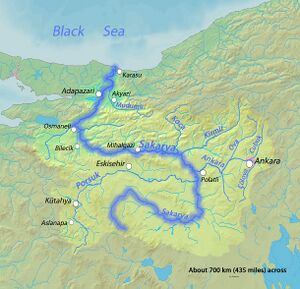Psilis
| Author:Laxman Burdak, IFS (R) |

Psilis was a river of ancient Bithynia that drained to the Pontus Euxinus (Black Sea).[1] It is identified with the modern Göksu Deresi [tr].[2]
Variants
- Psilis (Ancient Greek: Ψίλις)
- Psillis (Ψίλλις)
Jat clans
History
Mention by Pliny
Pliny[3] mentions....After passing the mouth of the Bosporus we come to the river Rhebas9, by some writers called the Rhesus. We next come to Psillis10, the port of Calpas11, and the Sagaris12, a famous river, which rises in Phrygia and receives the waters of other rivers of vast magnitude, among which are the Tembrogius13 and the Gallus14, the last of which is by many called the Sangarius.
9 Now the Riva, a river of Bithynia, in Asia Minor, falling into the Euxine north-east of Chalcedon.
10 Probably an obscure town.
11 On the river Calpas or Calpe, in Bithynia. Xenophon, in the Anabasis, describes it as about half way between Byzantium and Heraclea. The spot is identified in some of the maps as Kirpeh Limán, and the promontory as Cape Kirpeh.
12 Still known as the Sakaria.
13 Now called the Sursak, according to Parisot.
14 Now the Lef-ke. See the end of c. 42 of the last Book.
References
- ↑ Strabo. Geographica. Vol. 12.3.7. Page numbers refer to those of Isaac Casaubon's edition.
- ↑ Richard Talbert, ed. (2000). Barrington Atlas of the Greek and Roman World. Princeton University Press. p. 52, and directory notes accompanying.
- ↑ Natural History by Pliny Book VI/Chapter 1
Back to Rivers

